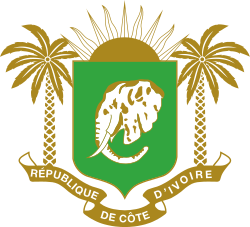| | ||||||||||||||||||||
| ||||||||||||||||||||
66 of 99 seats in the Senate 50 seats needed for a majority | ||||||||||||||||||||
This lists parties that won seats. See the complete results below.
| ||||||||||||||||||||
 |
|---|
Senatorial elections were held for the first time in Ivory Coast on 24 March 2018. [1]
| | ||||||||||||||||||||
| ||||||||||||||||||||
66 of 99 seats in the Senate 50 seats needed for a majority | ||||||||||||||||||||
This lists parties that won seats. See the complete results below.
| ||||||||||||||||||||
 |
|---|
Senatorial elections were held for the first time in Ivory Coast on 24 March 2018. [1]
On 14 February 2018, the government of Ivory Coast ruled that the first senatorial election would be held on 24 March 2018. The government also established new rules on appointing senators, who will be elected by National Assembly members, members of municipal, autonomous districts and regional councils. Each region and autonomous district will have two elected senators. The Senate will have a total of 66 elected senators. [1] [2]
The campaign was held from 19 to 22 March 2018. [3] With the opposition boycotting this election, it's expected it'll be widely won by the Rally of Houphouëtists for Democracy and Peace, which will present 33 lists of candidates, competing with a dozen of Independent lists of candidates. [4]
On 13 March 2018, the Independent Electoral Commission announced 58 lists of candidates were selected for the senatorial election. These list has to be approved by the Constitutional Council. [5]
 | ||||
|---|---|---|---|---|
| Party | Votes | % | Seats | |
| Rally of Houphouëtists for Democracy and Peace | 4,663 | 78.30 | 50 | |
| Independents | 1,292 | 21.70 | 16 | |
| Nominated senators | 33 | |||
| Total | 5,955 | 100.00 | 99 | |
| Valid votes | 5,955 | 96.52 | ||
| Invalid/blank votes | 215 | 3.48 | ||
| Total votes | 6,170 | 100.00 | ||
| Registered voters/turnout | 7,010 | 88.02 | ||
| Source: CEI [ usurped ] | ||||